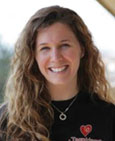Nurses Respond to Marathon Tragedy
 |  |  |
Kayla Quinn, Erin Davidson and Traci Camelo were among the many BWH nurses who played a vital role in the response to the Marathon bombings
|
With Patriots Day off, Kayla Quinn, NP, RN, of the Intensive Care Unit Float Pool, headed to Copley Square with her friend, Lauren St. Andre. She planned to spend the afternoon in front of Atlantic Fish Company, next to the Forum restaurant, on Boylston Street, cheering on runners as they crossed the finish line. When she learned that her friend Erin Davidson, BSN, RN, of BWH’s Center for Labor and Birth, was just on the other side of Forum, Quinn walked over to meet her.
About 20 minutes later, the first bomb went off to their left. “Everyone ran inside, and I stood on the patio trying to figure out what happened, if maybe some scaffolding had fallen or something,” Quinn recalled. “Ten seconds later, a bomb went off to my right.”
Instantly surrounded by devastation and suffering, Quinn followed her instincts and ran to the closest person who needed help. She used her belt to make a tourniquet for the man’s injured leg and stayed with him until EMTs arrived. “It was a lot of chaos; a lot of people needed help,” she said. “I tried to keep talking to the man I was caring for while we waited.”
Davidson, who had just stepped inside the Max Brenner restaurant, ran outside when she heard the sound. She checked to make sure her friends and fiancé were all right before rushing to join Quinn.
“I was caring for a young woman with abdominal and pelvic injuries,” Davidson said. “Everyone was helping in any way they could – someone used my belt as a tourniquet for another patient.”
Quinn and Davidson helped to transport people to ambulances when the EMTs arrived. When all of the victims had been taken to hospitals, Davidson helped Quinn wash the blood off her face at a nearby restaurant, and the two held hands as they went to rejoin their friends.
“We couldn’t even process what had just happened,” Davidson said. “We didn’t think twice about running in when the explosions happened – we knew we could do something to help.”
Quinn and Davidson are among countless BWHers who selflessly and courageously responded to the Boston Marathon tragedy, providing care for patients and families and support for each other. Nurses were an essential part of this heroic effort, whether at the scene in Copley Square or at the hospital.
Staff nurse Traci Camelo, RN, was caring for patients in the Center for Labor and Birth when the first of 35 marathon victims arrived in the Emergency Department. Camelo quickly switched gears, moving to where support was most needed. In the ED, she worked to stabilize and care for the injured coming from the finish line.
“Many of the patients were in shock, and I kept holding their hands and reassuring them,” said Camelo, who works one day in the Center for Labor and Birth and two days in the Emergency Department each week.
Shapiro 9/10 nurse Adrienne Haglin, RN, a finish line medical tent volunteer for the past three years, had been treating runners with cramps and dehydration throughout the day. After the explosions occurred, Haglin instantly began providing emergency care and helping victims reunite with their families, despite not knowing where her husband, a security volunteer at the finish line, was or if he was safe. They later reunited, both physically unharmed.
“I just tried to keep calm,” Haglin said. “Everyone rushed in to help without even thinking. So many of them had loved ones out there as well, but they didn’t think twice about helping.”
On Monday evening, associate chief nurses and executive nurse directors made rounds throughout the hospital. BWH President Betsy Nabel, MD, rounded on Monday evening and Tuesday morning as well, offering support to staff.
“At BWH, we did what we do best; we responded with strength to do everything possible for those in need,” said Nabel. “Words cannot express my gratitude for the swift action taken by staff across the institution. Thank you for your dedication, compassion and resilience as we all work together on behalf of our patients, their families and each other to begin to heal.”
Nancy Hickey, MS, RN, associate chief nurse of Medical Nursing and the Emergency Department, said that training, emergency drills and nurses’ expertise had prepared nursing staff to respond to the tragedy. All nurses went above and beyond, maintaining composure, compassion and clarity during an uncertain time.
“We were able to clear 20 ICU beds within an hour,” said Hickey. “I was so impressed with the expertise and professionalism of the staff. All of our nurses throughout the entire institution are heroes.”
Added Carolyn Hayes, PhD, RN, NEA-BC, associate chief nurse, Oncology Nursing: “Every day I come to work, I know I am privileged as a nurse to be with people during vulnerable times in their lives. I am always impressed with my nurse colleagues of our institution. On Monday, to my left and to my right, I saw competence and action wrapped up with compassionate humanity at its best. We couldn’t undo the act, but we found and continue to seek ways to mitigate the harm and meet violence with love. I was impressed and proud to be here.”
Debriefing sessions have been held and will continue to be scheduled throughout the days and weeks to come. Staff seeking emotional support are encouraged to contact the BWH Employee Assistance Program at 617-732-6017.